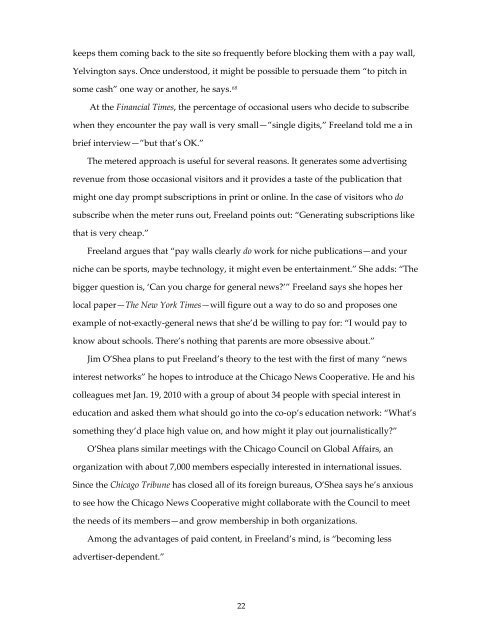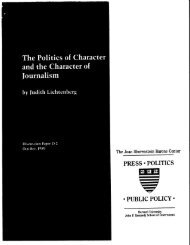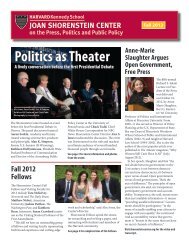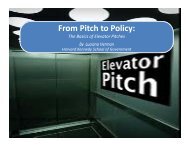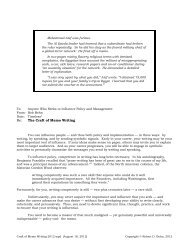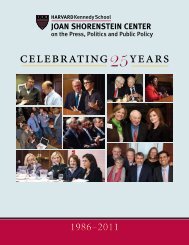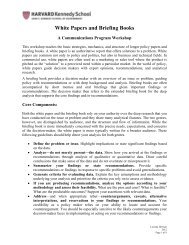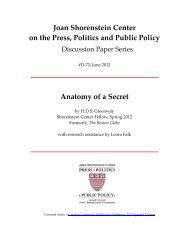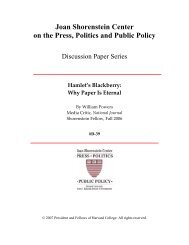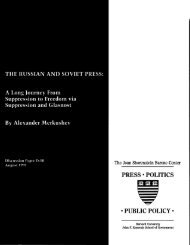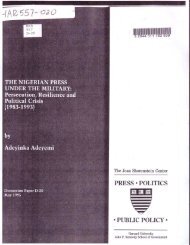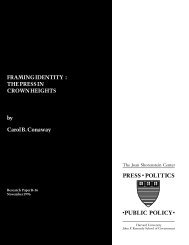A User-First Framework for Sustaining Local News - Harvard ...
A User-First Framework for Sustaining Local News - Harvard ...
A User-First Framework for Sustaining Local News - Harvard ...
Create successful ePaper yourself
Turn your PDF publications into a flip-book with our unique Google optimized e-Paper software.
keeps them coming back to the site so frequently be<strong>for</strong>e blocking them with a pay wall,<br />
Yelvington says. Once understood, it might be possible to persuade them “to pitch in<br />
some cash” one way or another, he says. 68<br />
At the Financial Times, the percentage of occasional users who decide to subscribe<br />
when they encounter the pay wall is very small—”single digits,” Freeland told me a in<br />
brief interview—”but that’s OK.”<br />
The metered approach is useful <strong>for</strong> several reasons. It generates some advertising<br />
revenue from those occasional visitors and it provides a taste of the publication that<br />
might one day prompt subscriptions in print or online. In the case of visitors who do<br />
subscribe when the meter runs out, Freeland points out: “Generating subscriptions like<br />
that is very cheap.”<br />
Freeland argues that “pay walls clearly do work <strong>for</strong> niche publications—and your<br />
niche can be sports, maybe technology, it might even be entertainment.” She adds: “The<br />
bigger question is, ‘Can you charge <strong>for</strong> general news?’” Freeland says she hopes her<br />
local paper—The New York Times—will figure out a way to do so and proposes one<br />
example of not‐exactly‐general news that she’d be willing to pay <strong>for</strong>: “I would pay to<br />
know about schools. There’s nothing that parents are more obsessive about.”<br />
Jim O’Shea plans to put Freeland’s theory to the test with the first of many “news<br />
interest networks” he hopes to introduce at the Chicago <strong>News</strong> Cooperative. He and his<br />
colleagues met Jan. 19, 2010 with a group of about 34 people with special interest in<br />
education and asked them what should go into the co‐op’s education network: “What’s<br />
something they’d place high value on, and how might it play out journalistically?”<br />
O’Shea plans similar meetings with the Chicago Council on Global Affairs, an<br />
organization with about 7,000 members especially interested in international issues.<br />
Since the Chicago Tribune has closed all of its <strong>for</strong>eign bureaus, O’Shea says he’s anxious<br />
to see how the Chicago <strong>News</strong> Cooperative might collaborate with the Council to meet<br />
the needs of its members—and grow membership in both organizations.<br />
Among the advantages of paid content, in Freeland’s mind, is “becoming less<br />
advertiser‐dependent.”<br />
22


